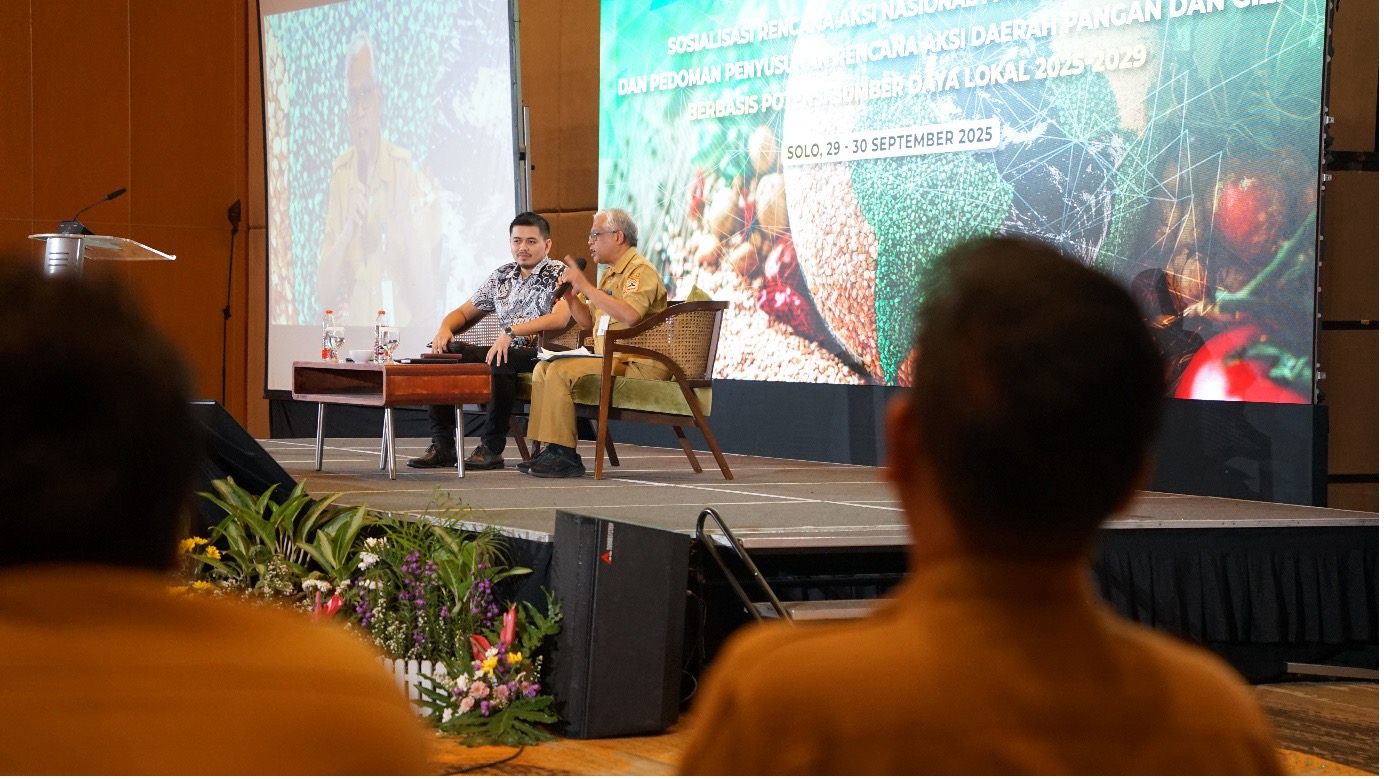Four Pathways for Climate – Nutrition integration in Indonesian policies
17th/Nov/2025
17th/Nov/2025
Climate change is not just an environmental issue; it intersects with systemic multiple aspects of human life. It interlinks the Sustainable Development Goals (SDGs) which aim to end hunger and poverty, preserve the environment, and ensure prosperity. In practice, climate change worsens hunger and hidden hunger as its increasing disasters, declining agricultural harvest and productivity, and threatening crop nutrition.
In Indonesia, climate change is increasing malnutrition risk. The highest temperature in the history remarked in 2023 where affected the food security and health in Indonesia. Rainfall was fluctuated significantly, drought, pest, disease and flood has been increased (BMKG 2024). The latest report shows that even short-term climate shocks able to heighten the risk of malnutrition (UNICEF 2025). For instance, in Indonesia, delayed monsoon seasons have negatively influenced weight among Indonesian children under two years old. The Food Security and Vulnerability Atlas recorded 74 districts and cities in Indonesia are still classified as food insecure (FSVA, 2021). Indonesia is still facing the triple burden malnutrition. Indonesian prevalence of stunting in 2024 is 19,8%, which are predominantly found in food-insecure areas and among vulnerable groups (SSGI, 2024).
The dual urgency of climate change and triple burden of malnutrition represents two of Indonesia’s most pressing challenges today. Hence, aligning nutrition with climate goals in policies, investments, and action is the solution which can strengthen food and health systems, meet the SDGs goals, and pursue the Paris Agreement 1.5 °C target .
In 2023 during the COP27, GAIN, WHO, FAO, UN-Nutrition secretariat and SUN launched Initiative Climate Action & Nutrition (I-CAN) and its baseline report . This report presented the state of integration between climate and nutrition policies.
Based on the report, Indonesia has average score 1.75 or on the level 1-2. The score shown that there is an initiate plan from the government to integrate to climate and nutrition aspects, however still no action plans or exact commitment and no further integrated mechanism yet.
GAIN Indonesia have been working on four pathways on integration of climate, food system and nutrition policies. This was done through range of activities, from policy advocacy, technical assistance for study and policy documents, and mainstreaming the issue through series of policy dialogues
Since 2024, GAIN have been actively participating in expert consultations meetings in the development of Indonesian Food and Nutrition Action Plan 2025-2029 . GAIN Indonesia participated in series of expert consultation meetings discussing integration of climate action in action and strategies in the action plan. It resulted in the integration of sustainable and resilient healthy local foods and food loss and waste management programs in the action plan.
GAIN proposed to integrate the climate-nutrition nexus framework in the National Action Plan for Food and Nutrition (RAN-PG) 2025–2029 and its implementation across various levels from national until local level. The framework involves four elements which are environmental system, health, water and social protection systems.
One of the main integration the action plan is the inclusion of climate-resilient local food systems and food loss and waste management. This is aligned with the UN Food Systems Stocktaking Moment +4: Convergence Initiative, and toward 2030, Indonesia’s long-term goal is to achieve the SDGs and build a sustainable food system based on eco-regional and local contexts by 2045. To achieve these goals,
GAIN provided recommendation for clear and actionable plan.
RAN-PG 2025–2029 emphasizes transforming food systems toward healthier, more diverse, and sustainable diets. A key component of this implementation is the development of environmentally friendly, climate resilient and nutritious local foods.
To help the government to implement the action plan, GAIN in collaboration with Directorate of Food and Agriculture, Directorate of Nutrition and Health at Bappenas (Ministry of Planning) and LCI are conducting a study to identify sustainable and resilient healthy local foods as evidence-based input for the RAN-PG and its sub-national action plan (RAD PG). The results will be used by Bappenas and local governments to guide RAN-PG and RAD-PG implementation in 8 provinces.
The study is conducted using GAIN tools on Nutrition Life Cycle Analysis (nLCA) based on Nutritional Value Score (NVS) and environmental life cycle analysis on selected local foods. GAIN also used climate vulnerability analysis to measure climate risk on supply chain of selected local foods in the 8 provinces. Two examples of the local foods are tempeh and small fish.

Figure 1 Workshop on the guideline for sub national action plan on food and nutrition based on local resources
Recently, the government announced that the RAN PG will be combined with the action plan on local foods. The GAIN’s study will be used to help local governments to develop their action plan on food and nutrition based on local resources (RAD PG BPSDL).
Furthermore, GAIN also supported the government to incorporate the commitment to include local foods, food loss and waste management and blue food in sub national food and nutrition action plan in 25 provinces – to Nutrition for Growth 2025.
The ways food is produced, consumed, and managed including the extent of loss and waste play a critical role in influencing the health and sustainability of both people and the planet. Ensuring healthy diets for 10 billion people by 2050 within the planet’s ecological boundaries is essential.
In Indonesia, environmental consideration in national dietary guidelines is still lacking. Therefore, raising environment and climate awareness, from the national level food-related policy makers to local governments, communities and businesses is the first step. GAIN is supporting the efforts to greening national dietary guidelines through 2 activities; Dietary Shift Competition and Policy Dialogue on sustainable and healthy diets.
In 2024, we started with communities and small businesses. Together with EAT, Food and Land Use Coalition (FOLU), and Nutrition Connect, GAIN conducted a Dietary Shift Competition (DISH). The DISH competition promoted planetary health diets to community groups and small businesses in Indonesia. DISH was designed to uncover local solutions that encourage healthy and sustainable dietary shifts in Indonesia. DISH bundled solution focuses on promoting healthy and sustainable dietary shifts through culturally grounded and community-driven approaches.
In 2025, GAIN in collaboration with Ministry of Health (MoH), National Food Agency (NFA/ Bapanas) and Jejaring Pasca Panen untuk Gizi Indonesia (JP2GI) to host a policy dialogue about Planetary health diets integration into the national dietary guidelines. It was found that the B2SA guidelines by NFA is starting to adapt planetary health diet concept. The policy dialogue is the first episode of the Bincang Pangan Sehat Lestari campaign series.

Figure 2 Bincang Pangan Sehat Lestari Episode 2: The Local Foods in the School Meal Program
The Indonesian government is currently drafting the Revision of Food Law No.18/2012. GAIN supports the expert consultation from engage with policymakers, facilitate meetings and FGD, and provided experts. The law amendment will strengthen clauses and verses concerning Food Loss and Waste (FLW) management and the promotion of local food.
To gather broader stakeholders’ participation and increasing the public awareness to the food law amendment, GAIN Indonesia and JP2GI also conducted the policy dialogue: Direction of Food System Transformation in the Food Law Amendment. This dialogue was attended by 253 participants from national-local governments, NGOs, and private sectors. The discussion highlights the themes of food diversification, local foods, import regulation, and land use in food systems. The dialogue reaffirmed that Indonesia’s food system transformation must be built on principles of sustainability, sovereignty, equity and diversity. This event was the episode 3 of Bincang Pangan Sehat Lestari.
GAIN is also currently working with Directorate of Environment at Bappenas, to support nutrition integration in the national climate change adaptation plan and the National Action Plan of Climate Resilient Development Indonesia (Rencana Aksi Nasional Pembangunan Berketahanan Iklim / RAN PBI).
The support will be done through series of studies on nutrition-sensitive climate risk in Indonesia. This study will provide evidence and knowledge to raise awareness of policymakers on climate change impacts to micronutrient supply and nutritional status. This is part of long-term policy advocacy strategy for the integration of nutrition into the national climate adaptation agenda. This climate action plan is expected to align with RAN-PG to ensure both policies support national and shared objectives, linking nutrition and climate outcomes.
GAIN will continue to work to integrate food systems transformation and nutrition into National Determined Contribution (NDC) for Paris Agreement, to reduce emission from food systems and strengthen transformation into sustainable and healthier food systems.
GAIN is continuing working to support climate-integration in multiple policies and programs. The policy integration should be translated into real action and activities, as well as budget allocation and investment. The real actions are urged to be implemented in collaboration, leverage multi-stakeholder collaboration between government, private sector, civil society, academia. Based on the sustainable and resilient healthy local foods identified in the current study, in 2026, GAIN will continue to work to promote those foods in the selected regions.

Project Officer, GAIN Indonesia

Environment Manager